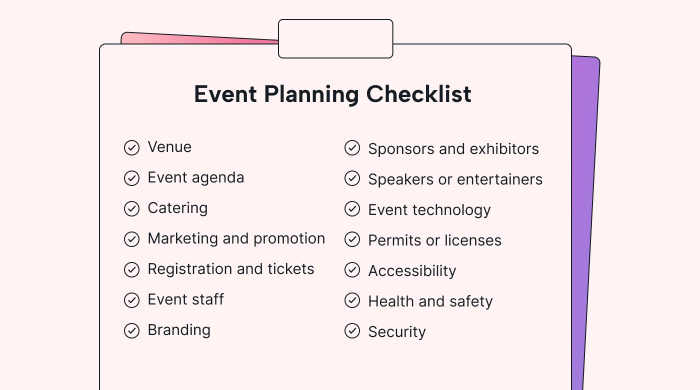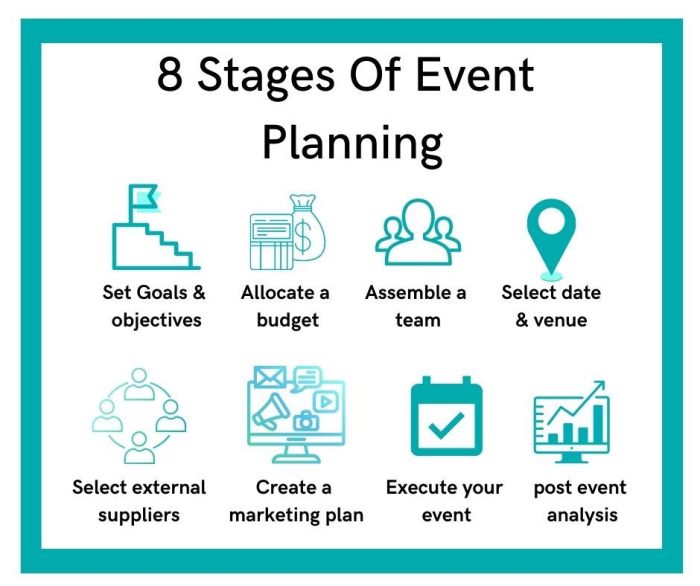Event Planning Tips – Get ready to dive into the world of event planning with these killer tips. From setting objectives to logistical planning, we’ve got you covered with everything you need to know to make your event a smashing success.
Importance of Event Planning
Event planning is a crucial aspect of hosting successful events. Effective planning can make a significant impact on the overall experience for attendees, ensuring that everything runs smoothly and according to plan. On the other hand, events that fail due to poor planning can lead to disappointment, frustration, and even financial loss for organizers.
Prevent Chaos and Confusion
- Proper event planning helps prevent chaos and confusion during the event, ensuring that all details are well-organized and executed smoothly.
- From setting up the venue to coordinating schedules and managing vendors, every aspect of the event needs to be carefully planned to avoid any last-minute issues.
Enhance Attendee Experience
- Well-planned events create a positive experience for attendees, leaving a lasting impression and encouraging them to attend future events.
- From engaging activities to seamless logistics, effective event planning can enhance the overall satisfaction of attendees and increase the success of the event.
Examples of Failed Events
- The Fyre Festival disaster is a prime example of an event that failed spectacularly due to poor planning, resulting in stranded attendees, subpar accommodations, and legal repercussions.
- A music concert that oversold tickets without proper crowd control measures ended up in chaos and safety concerns, highlighting the importance of accurate planning.
Setting Objectives and Budget

Setting clear objectives for an event is crucial for its success. This involves defining the purpose of the event, identifying the target audience, and determining what you hope to achieve by the end of it.Establishing a realistic budget is equally important as it helps you stay on track financially and avoid overspending. A budget Artikels the costs associated with different aspects of the event and ensures that resources are allocated efficiently.
Allocating Budget Effectively
- Start by prioritizing key aspects of the event such as venue, catering, entertainment, and marketing.
- Allocate a larger portion of the budget to areas that are crucial for achieving the event objectives.
- Consider negotiating prices with vendors to get the best deals without compromising on quality.
- Keep track of expenses throughout the planning process to avoid exceeding the budget.
- Be prepared to make adjustments if necessary to stay within budget constraints.
Venue Selection: Event Planning Tips
When it comes to choosing the perfect venue for your event, there are several key factors to consider. From the size of the space to the location and amenities available, each decision can have a big impact on the overall success of your event.
Factors to Consider
- Capacity: Make sure the venue can comfortably accommodate all your guests.
- Location: Consider accessibility and transportation options for attendees.
- Amenities: Check if the venue offers necessary facilities like parking, restrooms, and catering services.
- Ambiance: Ensure the venue aligns with the theme and tone of your event.
Indoor vs. Outdoor Venues, Event Planning Tips
Indoor venues provide protection from the elements and often come equipped with climate control systems, making them ideal for events that require a controlled environment. On the other hand, outdoor venues offer a unique ambiance and can be a great choice for more casual or seasonal events.
Pros of indoor venues include weather protection, controlled environment, and built-in amenities. However, they may lack natural lighting and outdoor space. Outdoor venues, on the other hand, provide a picturesque setting, ample space, and a breath of fresh air. Yet, they are subject to weather conditions and may require additional arrangements for seating and amenities.
Negotiating Contracts and Securing the Right Venue
- Start early: Begin your venue search well in advance to have more options and leverage in negotiations.
- Be flexible: Consider off-peak days or times for better pricing and availability.
- Review contracts carefully: Pay attention to cancellation policies, additional fees, and requirements.
- Ask for discounts or perks: Don’t hesitate to negotiate for better pricing or complimentary services.
Event Marketing and Promotion
Marketing plays a crucial role in event planning as it helps create awareness, generate interest, and attract attendees. Effective promotional strategies are essential to ensure a successful turnout at the event. Utilizing social media platforms can greatly enhance the reach and engagement of event promotion.
Different Promotional Strategies
- Utilize email marketing campaigns to reach out to a targeted audience and provide them with event details and updates.
- Collaborate with influencers or partners to leverage their audience and increase visibility for the event.
- Implement referral programs where attendees can invite friends and receive incentives, encouraging word-of-mouth promotion.
- Offer early bird discounts or exclusive perks to incentivize early registration and boost ticket sales.
Utilizing Social Media Platforms
- Create engaging content that showcases the event highlights, speakers, and activities to pique interest and encourage sharing.
- Use event hashtags to increase visibility and create a sense of community around the event.
- Run targeted ads on social media platforms to reach a specific demographic and drive ticket sales.
- Engage with followers by responding to comments, messages, and inquiries promptly to build relationships and trust.
Logistical Planning
Logistical planning plays a crucial role in the success of any event. It involves coordinating various aspects such as transportation, accommodations, and catering to ensure a smooth and seamless experience for attendees.
Essential Logistical Elements Checklist
- Transportation: Arrange for transportation to and from the event venue, whether it’s shuttle services, parking options, or public transportation.
- Accommodations: If guests are traveling from out of town, provide information on nearby hotels or lodging options.
- Catering: Plan the menu according to dietary restrictions and preferences of attendees. Ensure there are enough food and beverage options for everyone.
- Equipment and Supplies: Make a list of all the necessary equipment and supplies needed for the event, such as audiovisual equipment, seating arrangements, and signage.
- Timeline: Create a detailed timeline outlining the schedule of events, including set-up and breakdown times.
Tips for Coordinating Logistics
- Start Early: Begin planning logistics well in advance to have enough time to secure vendors and make necessary arrangements.
- Communication is Key: Maintain open communication with vendors, suppliers, and team members to ensure everyone is on the same page.
- Stay Organized: Keep all logistical details, contacts, and documents in one central location to avoid any last-minute issues.
- Consider Contingencies: Have backup plans in place for any unforeseen circumstances that may arise during the event.
- Delegate Responsibilities: Assign specific tasks to team members or volunteers to effectively manage logistics on the day of the event.
Creating an Event Timeline

Planning an event requires careful attention to detail, and one crucial aspect is creating a comprehensive event timeline. A well-thought-out timeline serves as a roadmap for the entire event, ensuring that everything runs smoothly and according to plan.
Importance of a Detailed Event Timeline
- A detailed event timeline helps keep track of all the tasks and deadlines leading up to the event.
- It ensures that all stakeholders are on the same page regarding the sequence of activities.
- By mapping out the event flow in advance, you can anticipate any potential bottlenecks or issues and address them proactively.
Creating a Timeline for Smooth Event Flow
- Start by listing all the key tasks and milestones that need to be completed before, during, and after the event.
- Assign realistic timeframes to each task, taking into account dependencies and the time required for setup, execution, and cleanup.
- Include buffer time between activities to account for unexpected delays or last-minute changes.
- Communicate the timeline to all team members and vendors involved in the event to ensure alignment and accountability.
Adjusting the Timeline for Unforeseen Circumstances
- Stay flexible and be prepared to make real-time adjustments to the timeline as needed during the event.
- Prioritize tasks based on criticality and impact on the overall event flow to manage unexpected challenges effectively.
- Delegate decision-making authority to key team members to address issues quickly and keep the event on track.